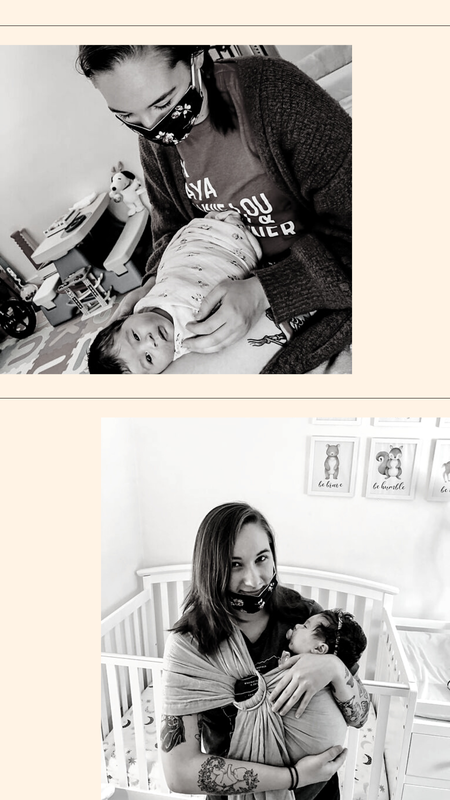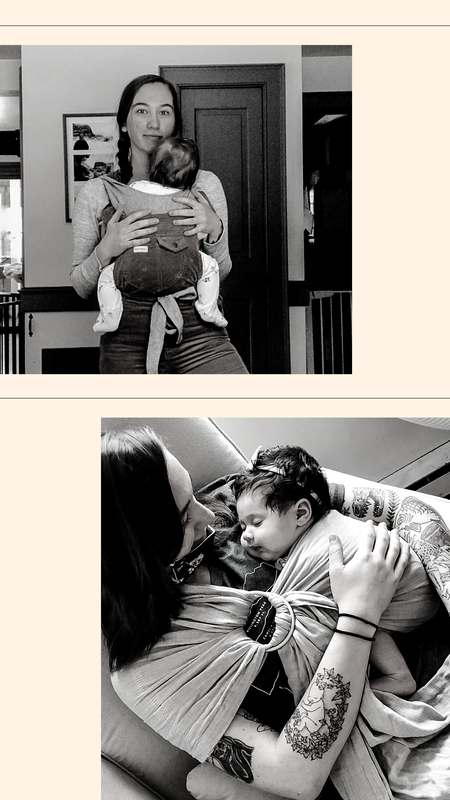PMADs, What are they?2/4/2023 Let’s start by defining PMADs: Perinatal or postpartum mood and anxiety disorder (PMAD) is the term used to describe distressing feelings that occur during pregnancy (perinatal) and throughout the first year after pregnancy (postpartum). This is different from baby blues. Around 50 percent to 80 percent of new mothers experience mood swings during the first two to three weeks after giving birth. This is referred to as the “baby blues”. Symptoms of a perinatal or postpartum mood disorder occur daily for more than two weeks. If you believe you are experiencing PMADs please reach out to a healthcare provider or, if necessary, call 911 for emergency help. Symptoms of a mood disorder:
Types of PMADs: Perinatal or postpartum depression: Depression that occurs after childbirth. Symptoms might include insomnia, loss of appetite, intense irritability, and difficulty bonding with the baby. Treatment may include counseling or medication. Perinatal or postpartum anxiety disorder: 10 percent of pregnant and postpartum women experience significant anxiety symptoms. Symptoms include
Perinatal or postpartum psychosis: One in 1,000 suffer a rare and severe form of a mood disorder called perinatal or postpartum psychosis.Those who have been diagnosed with a bipolar disorder, schizophrenia or other psychiatric challenges may have a higher risk for developing this form of mood disorder. Women who have experienced perinatal or postpartum psychosis in the past have a 30 percent to 50 percent recurrence risk. Symptoms include:
Perinatal or postpartum obsessive-compulsive disorder (OCD): OCD is an often misunderstood and misdiagnosed disorder that affects as many as 3 percent to 5 percent of new mothers and even some new fathers.Risk factors include a personal or family history of anxiety or OCD. More than 38 percent of women with OCD also struggle with an underlying mood disorder.Intrusive thoughts and images are the most common symptoms. Research has shown that these images are driven by anxiety and not psychosis. Other symptoms may include:
PMAD Statistics:
Effects on baby: If left untreated, PMADs adversely affect parental cognitions and beliefs, attachment to the infant, and the growing caregiver-infant relationship. PMADs affect early developmental outcomes of infants including neurosynaptic development, regulatory development, and developmental milestones.PMADs can lead to premature birth, risk of SIDs, and a need for neurodevelopmental or neurobehavioral support. Research shows that depressed and anxious parents often smile less, talk less, and are less likely to touch or engage with their newborns throughout the first year of life. Children of parents with depression and anxiety may develop learning, attention or behavioral difficulties as they grow older. Older children may also suffer from the loss of maternal/paternal attention and support, and they may become depressed or anxious as teenagers. Endocannabinoids and PMADs: Endocannabinoids are responsible for helping regulate various processes, such as pain, memory, mood, immunity, and stress. The endocannabinoid system is known to have positive effects on depression. One way to improve mental health is exercise. Intense exercise increases circulating endocannabinoid. Including exercise in your routine can help combat PMADs and baby blues. A study published in the British Journal of Sports Medicine found that endurance exercise increases the level of endocannabinoids in the body. These substances have an effect similar to the active ingredient in marijuana. Another way to reinforce endocannabinoids is through food. Endocannabnoid reinforcing foods include: Hemp seeds and oil, chia seeds, walnuts, flax seeds and oils, eggs, sardines and anchovies. Essential fatty acids, chocolate, herbs, spices, and tea can also naturally stimulate the endocannabinoid system (ECS). The ECS is involved in reconsolidation and extinction of the fear memory in the fear memory paradigms as well as in anxiety. Endocannabinoid signaling may ensure an appropriate reaction to stressful events. Including ECS reinforcement in your postpartum plan could be extremely beneficial! Disparities in PMADs: African American women have a higher risk of developing perinatal depression compared to white women, Latina women also have a higher risk. Current research from the Icahn School of Medicine at Mount Sinai found that 44% of African Americans reported depressive symptoms two weeks after delivery, compared to 31% percent of white women. Are they rising? Yes, but why? NY Times says: “Postpartum depression and the larger group of maternal mental health conditions called perinatal mood and anxiety disorders are caused by neurobiological factors and environmental stressors. Pregnancy and the postpartum period are already vulnerable times for women due in part to the hormonal fluctuations accompanying pregnancy and delivery, as well as the sleep deprivation of the early postpartum period. Now, fears about the health of an unborn child or an infant and the consequences of preventive measures, like social distancing, have added more stress.” Isolation is a huge factor in mental health struggles. Isolation during the pandemic may be a factor increasing PMADs, along with the new fears that the pandemic has instilled in families. I think that social media plays a role in this as well. So many new parents have unrealistic expectations because of what they see other people share, but other people only share the good (usually). The let down parents are experiencing results in unhealthy feelings of blame and guilt or shame that they are not the best parent. In reality, we could be using social media to spread more awareness and create a better understanding of what so many people go through in pregnancy and postpartum. Another way to decrease PMADs effects on a family is to increase postpartum appointments and include a PMAD screening at prenatal and postpartum visits. Prevention is so important and a key part of preventing PMADs is increasing support. Parents should try to put support plans in place before the baby arrives. This could include a meal train, family members visiting, a babysitter, etc. Resources:
References:
Anonymous. (2018, March 16). My postpartum exercise addiction - seleni - maternal mental health institute. Seleni. Retrieved May 11, 2022, from https://www.seleni.org/advice-support/2018/3/16/my-postpartum-exercise-addiction Heyman E, Gamelin FX, Goekint M, Piscitelli F, Roelands B, Leclair E, Di Marzo V, Meeusen R. Intense exercise increases circulating endocannabinoid and BDNF levels in humans--possible implications for reward and depression. Psychoneuroendocrinology. 2012 Jun;37(6):844-51. doi: 10.1016/j.psyneuen.2011.09.017. Epub 2011 Oct 24. PMID: 22029953. Kozhimannil, K. B., Trinacty, C. M., Busch, A. B., Huskamp, H. A., & Adams, A. S. (2011). Racial and ethnic disparities in postpartum depression care among low-income women. Psychiatric services (Washington, D.C.), 62(6), 619–625. https://doi.org/10.1176/ps.62.6.pss6206_0619 Lakshmin, P. (2020, May 27). Experts fear increase in postpartum mood and anxiety disorders. The New York Times. Retrieved May 6, 2022, from https://www.nytimes.com/2020/05/27/parenting/coronavirus-postpartum-depression-anxiety.html Ruehle, S., Rey, A. A., Remmers, F., & Lutz, B. (2012). The endocannabinoid system in anxiety, fear memory and habituation. Journal of psychopharmacology (Oxford, England), 26(1), 23–39. https://doi.org/10.1177/0269881111408958
0 Comments
Leave a Reply.The light isn't green forever. AuthorJess Kimball is a Full Spectrum Doula and Certified Lactation Counselor trained in Ayurvedic and Chinese medicine. |
|
EST. 2016
North Carolina | Vermont Jess Kimball |
© COPYRIGHT 2015. ALL RIGHTS RESERVED.
Jess Kimball provides doula care, birth photography, and a variety of other services to families!
|

 RSS Feed
RSS Feed
